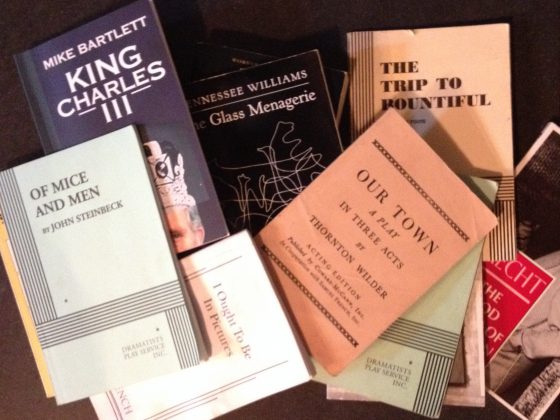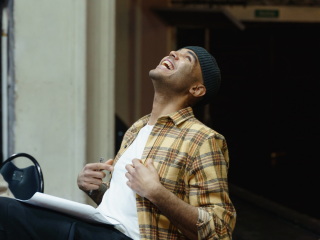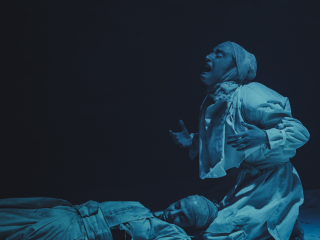Good acting is complicated. Being a nuanced and believable character inside a set of imaginary circumstances? While also meeting the theatrical demands of being clearly seen and understood? Oh wait, while also listening to your director and ensuring you meet their vision and expectations? And maintaining a safe and secure distance from your character so that you don’t endure negative psychological effects? Oh, and then additionally not being a horrible and unbearable presence to everyone around you? And hitting your spike? And finding your light? And remembering that you cross after the sound cue now, (a change that was made at final dress), while also ensuring that your new blocking doesn’t take you out of your organic moment. That is A LOT of things. A lot of complex things.
Certain skills come more easily to us than others. Some actors have an inherent theatricality, easily present and commanding on stage. Others struggle with that level of immediate oomph, but find themselves more authentic and present in the moment, easily believable. Some people have an incredible vocal range and variety, other actors have more physical stamina and athleticism that lends itself to different roles. Some of us (all of us?) never know what to do with our arms. We are many types of actors, and available to us are many types of tools.
So which ones are, uh, like, good?
Listen, I’ve by no means “done it all” in terms of actor training…but I’ve dabbled. Tons of pitch, diction and breathing warm-ups (tongue twisters for days! Linklater Vocal Techniques!); physical stretching, practices and workouts (Yoga! T’ai-Chi! Suzuki! Tremoring!); combat classes (I hit someone in the shin with a staff, sorry Josh!)’; dialect work (my Australian turns into New Jersey??); Shakespeare and style-specific courses (“Duty” is not pronounced “Dooty”!); techniques that I have great ambivalence about (Meisner repetition, Stanislavski’s emotional recall); and ones I’m obsessed with and wish I did every day (Bogart’s Viewpoints, mainly).
But of all these tools thrust upon me in acting school and various productions, which have I continued to use in my acting career? It turns out–nearly all of them…just not all of them, all the time.
Which ones should you do? Well, to be honest: I don’t really know, y’all. Different shows call for different methods. How much vocal work do you need to do? Depends, how vocally demanding is the show? How much physical warm-up is required? Well, how much movement is your character doing? You probably don’t need to do deep emotional recall for a lighthearted farce, and how you prepare for Waiting for Godot will be different than how you prepare for The Medea. Mostly I’d say do the ones that feel right and that you’ll actually commit to doing. But here are my suggestions:
DEFINITELY DO
Warm up
Warmups are pivotal for preparing your voice and body to safely exist in the world of your play. They’re also an important tool for cast bonding and ensemble building. They’re a chance to center yourself before performance. A confession: I hate warmups. (Sorry everyone.) So I’m saying this as much for myself as I am for you. They’re important, they matter, they’re for our health and our focus and our connection. Do them. Do something for your body, something for your voice, and something to connect you with the rest of your cast.
Always go back to the script for answers
To me, the text is the basis of everything we do as actors. Now, there are many different ways to interpret a text, many different visions that are completely acceptable. But if you can’t find a way to justify your choices through the script, then you’re not honoring the script. That being said, I absolutely think works are meant to be re-imagined, reworked, reborn. Forget traditional casting! Forget gender norms! Forget comparing ourselves to the original Broadway cast! But…the truth, the potential truths, still live in the script somewhere–as do the goals, objectives, character relationships, subtext, arc–all the juicy stuff! Find them, discuss them, obsess over them.
Talking and Listening
I feel that it’s important, no matter the play, no matter the style–to listen and respond to your scene partner. You can’t act in a vacuum, and you’re not acting against a wall. If the way your partner delivers their line doesn’t change the way you’re delivering yours, then you’re not listening to what they have to say. Keep yourself fresh, keep yourself from getting stuck, from anticipating your line rather than responding to it.
DEFINITELY DON’T
Do any techniques that are emotionally/psychologically/physically unsafe for you
I’ve absolutely had a role where I dove in too deep emotionally and felt that I couldn’t connect to my character without putting myself in a rough emotional place for the duration of the run. Rather than do that, maybe look for other safer techniques to help you find the depth you’re looking for.
Act like a big turd to your castmates or crew
Like don’t be Jared Leto trying to method act The Joker by sending dead animals to his cast mates, you know what I’m saying? Don’t take over the entire backstage area or pick an activity that inhibits your fellow actors from their ability to focus and prepare.
Have a bad attitude about trying new techniques (unless you feel that they are unsafe)
Things that don’t work for you may work for others. Pushing yourself out of your comfort zone is important for your growth as a performer.
So, if we’re keeping all of these safe practices in our pockets for a rainy day, what do we throw away?
Throw away the toxic instructor that devalued you at every turn. The casting director who implied you weren’t good-looking enough. The eat-or-be-eaten attitude that we serve to our fellow actors at auditions. The fear of taking a risk. The need to list out your resumé to prove your worth to your new cast mates. Your imposter syndrome. Your type. Anything that’s holding you back from believing that you are capable and worthy.
I don’t have all the answers, friends. I’m just one person trying to stay sane out here and maintain my reputation as a B- actor. But I do know this: keep what works for you, toss what doesn’t, and be nice to everyone–including yourself.















1 comment
I loved this! So we’ll written and genuine 🙂